
The Catalan independence movement is a social and political movement with roots in Catalan nationalism, which seeks the independence of Catalonia from Spain and, by extension, the independence of North Catalonia from France and that of other Catalan Countries.

Oriol Junqueras i Vies is a Spanish politician, historian and academic from Catalonia. A former mayor of the municipality of Sant Vicenç dels Horts in north-eastern Spain, Junqueras served as Vice President of Catalonia from January 2016 to October 2017 when he was removed from office following the Catalan declaration of independence and entered prison, convicted to 13 years for his role in organizing the 2017 Catalan independence referendum. He is president of the Republican Left of Catalonia (ERC). Born in 1969 in Barcelona, Junqueras grew up in the municipality of Sant Vicenç dels Horts. After graduating from the Autonomous University of Barcelona, he taught history at the university.
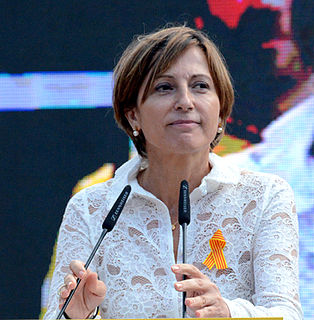
Maria Carme Forcadell i Lluís is a Spanish politician from Catalonia. She is the former President of the Parliament of Catalonia, as well as a Catalan high school teacher, known for her Catalan independence activism.

Jordi Sànchez i Picanyol is a Spanish political activist from Catalonia, who was president of the Catalan National Assembly (ANC) between May 2015 and November 2017.

Carles Puigdemont i Casamajó is a Catalan pro-independence politician and journalist from Spain. He lives in self-imposed exile in Belgium, under threat of arrest if he returns to Spain. A former Mayor of Girona, Puigdemont served as President of the Government of Catalonia from January 2016 to October 2017 when he was removed from office by the Spanish Government following the unilateral Catalan declaration of independence. He is co-founder of the National Call for the Republic (CNxR) and leader of the Junts per Catalunya (JuntsxCat) electoral alliance.
The Catalan independence referendum of 2017, also known by the numeronym 1-O in Spanish media, was an independence referendum held on 1 October 2017 in the Spanish autonomous community of Catalonia, passed by the Parliament of Catalonia as the Law on the Referendum on Self-determination of Catalonia and called by the Generalitat de Catalunya. It was declared unconstitutional on 7 September 2017 and suspended by the Constitutional Court of Spain after a request from the Spanish government, who declared it a breach of the Spanish Constitution. Additionally, in early September the High Court of Justice of Catalonia had issued orders to the police to try to prevent it, including the detention of various persons responsible for its preparation. Due to alleged irregularities during the voting process as well as to the use of force by the National Police and Civil Guard, international observers invited by the Generalitat declared that the referendum failed to meet the minimum international standards for elections.

Jordi Cuixart i Navarro is a Spanish businessman and cultural activist from Catalonia. He is the president of Òmnium Cultural, a non-profit cultural organisation founded in 1961 with more than 160,000 members and 40 local branches in Catalonia. As part of his role in the pro-independence demonstrations prior to the Catalan independence referendum of 2017, he has been imprisoned since October 2017 under charges of sedition and violent rebellion brought by the Spanish prosecutor's office. Cuixart was sentenced to nine years of prison for sedition. Amnesty International believes his detention and sentence constitutes a disproportionate restriction on his rights to free speech and peaceful assembly, and urges Spain to free him.
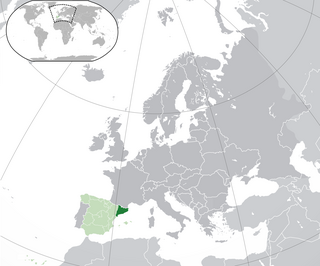
The 2017–18 Spanish constitutional crisis, also known as the Catalan crisis, was a political conflict between the Government of Spain and the Generalitat de Catalunya under former President Carles Puigdemont—the government of the autonomous community of Catalonia until 28 October 2017—over the issue of Catalan independence. It started after the law intending to allow the 2017 Catalan independence referendum was denounced by the Spanish government under Prime Minister Mariano Rajoy and subsequently suspended by the Constitutional Court until it ruled on the issue. Some international media outlets have described the events as "one of the worst political crises in modern Spanish history".
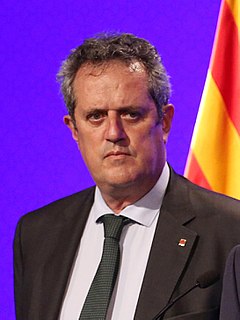
Joaquim Forn i Chiariello is a Spanish politician and lawyer from Catalonia. A former deputy mayor of the city of Barcelona in north-eastern Spain, Forn served as Minister of the Interior from July 2017 to October 2017 when he was removed from office following the Catalan declaration of independence.

The Operation Anubis was a police operation in Catalonia Spain, initiated on 20 September 2017 by the Civil Guard following orders of the trial court number 13 of Barcelona, directed by judge Juan Antonio Ramírez Sunyer. Its aim was to dismantle the framework of the Catalan independence referendum of 1 October 2017, that was suspended on 6 September 2017 by the Constitutional Court of Spain as breaching the 1978 Constitution. Different headquarters of the Generalitat de Catalunya were searched and 14 people were arrested, including high ranking administrative staff, and company CEO's involved in the preparation of the referendum. Simultaneously, several printing and media companies were searched looking for ballot papers and boxes. More than 140 websites were shut down by the Spanish justice and police.
As a result of the advisory 2017 Catalan independence referendum, reactions came from a multitude of avenues, including the domestic central state and other official bodies, as well as international commentary. Whilst the government and non-government community in Catalonia defended the vote, most of the international community either defended Spain's "territorial integrity" or simply criticised the central police's overhanded response. Other sub-national entities also supported Catalonia.

Catalan separatists held a general strike on 3 October 2017 following Catalonia's referendum on independence two days earlier. The referendum, which was held in defiance of Spanish national court orders, resulted in over 900 people injured as the national police attempted to prevent Catalans from voting. The violence galvanized separatist support for the strike, whose planning predated the crackdown, and led to endorsements from the Catalan government, the Catalan branches of the country's two largest labor unions, and pro-independence cultural groups.
Committees for the Defense of the Referendum (CDR), or Referendum Defense Committees, are the neighborhood groups set up in Catalonia prior to the 2017 Catalan independence referendum in the wake of the 2017 Spanish constitutional crisis to carry out the referendum swiftly in spite of the Spanish government's imposition of a ban on the unilateral referendum.
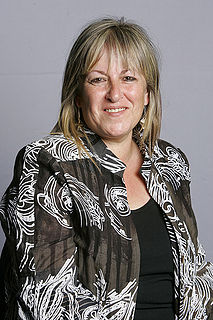
Ramona Barrufet i Santacana is a Spanish Catalan teacher and politician who has been a deputy in the Parliament of Catalonia for the IX, X and XI legislatures and has been the Fourth Secretary on the Parliament's Board since 2015 until 2017. She is a member of the Democratic Convergence of Catalonia party (CDC).
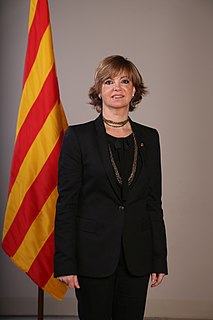
Meritxell Borràs i Solé is a Spanish politician and pharmacist from Catalonia. Borràs served as Catalonia's Minister of Governance and Institutional Relations from June 2015 to October 2017 when she was removed from office following the Catalan declaration of independence.

Jordi Turull i Negre is a Spanish politician associated with the Catalan European Democratic Party (PDeCAT). Since March 2018 he has been in pre-trial custody by order of the Supreme Court of Spain and accused of sedition and rebellion. On July 10, 2018 a Supreme Court judge suspended him as a deputy in the Catalan parliament.

The trial of Catalonia independence leaders, legally named Causa Especial 20907/2017 and popularly known as the Causa del procés, was an oral trial that began on 12 February 2019 in the Supreme Court of Spain. The case was tried by seven judges and was chaired by judge Manuel Marchena. Judge Pablo Llarena had previously coordinated an instruction between October 2017 and July 2018, as a result of which 12 people were tried, including the previous vice president Oriol Junqueras of the regional government and most of the cabinet as well as political activists Jordi Sànchez and Jordi Cuixart and the former Speaker of the Parliament of Catalonia Carme Forcadell. Some defendants remained in pre-trial detention without bail from the beginning of the instruction process and have thus already served part of their sentence.

Lluís Maria Corominas i Díaz is a Catalan lawyer, politician and a former member of the Parliament of Catalonia. He is currently awaiting trial on charges of disobedience for his role in the Catalan declaration of independence.
Democratic Tsunami is a Catalan protest group advocating for a self-determination referendum in Catalonia, formed and organized in the lead up to the final judgement on the Trial of the Catalonia independence leaders. It organizes supporters of the Catalan independence movement through the use of social media, apps and other online resources. It used a 'bespoke' Android app, along with a Telegram account with over 410,000 followers in order to mobilize and organize demonstrations during the 2019 Catalan Protests. Distributed outside of the official market for Android apps, the application infringes the European legislation for data protection in regards of geolocalization.

Catalan separatists held a general strike on 18 October 2019, also known as 18-O, on the fifth night of the 2019 protests following the verdict against Catalonia independence leaders for their participation in a referendum on independence two years earlier. Strikes for political reasons are banned in Spain. The main labor unions in the country, UGT and CCOO, did not participate.






















